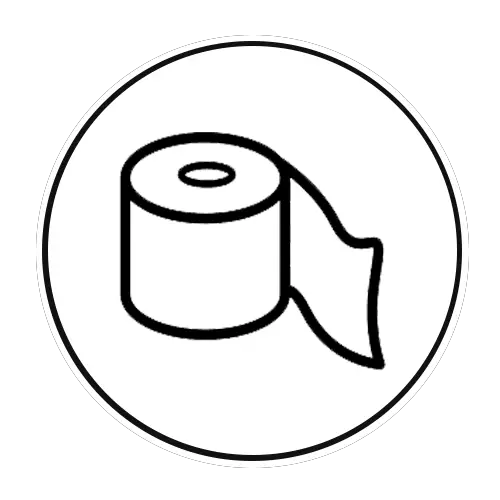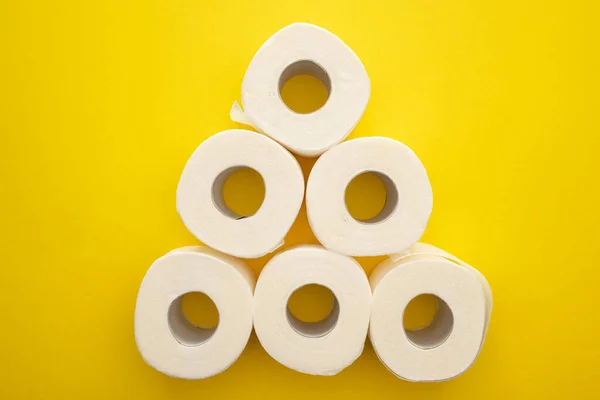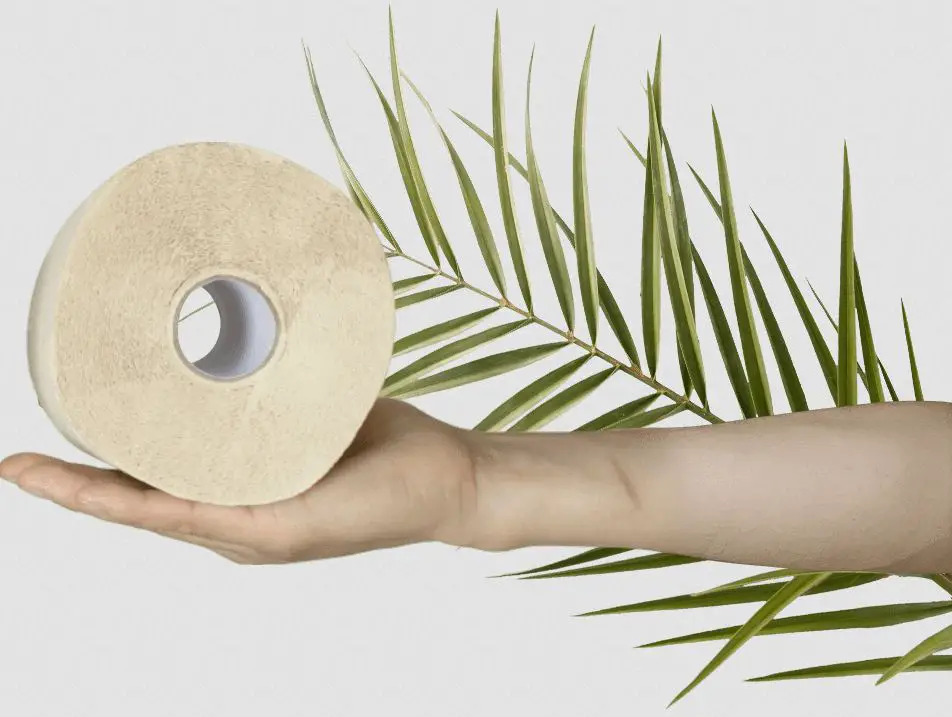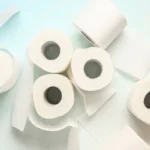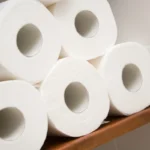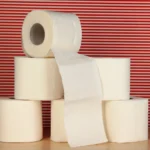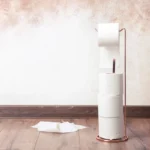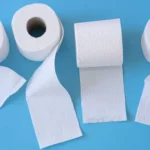Recycled and bamboo toilet paper is two environmentally friendly alternatives to traditional toilet paper. Both have benefits and drawbacks, but which will win the battle of recycled toilet paper vs bamboo? Let’s dig in.
The Best of Both Worlds: Recycled Toilet Paper Vs Bamboo
Reusing is the best way to help the environment. But sometimes, you must choose between two options that support recycling and reusing. In those cases, you may want equal weighting to your priorities. Here’s how they compare:
- Cost: Recycled TP is more affordable than bamboo (3 cents/sheet vs 5-9 cents/sheet).
- Environmental friendliness: Both are excellent choices for environmentally friendly products. However, bamboo is under criticism for its production methods. It can harm local ecosystems when large amounts of trees are harvested at once by machine rather than hand-picked by local villagers. On the other hand, recycled TP uses old newspapers, which would otherwise go into landfills. As long as these papers don’t include toxic chemicals like dioxin, there shouldn’t be any health concerns related to us through our toilet tissue usage habits!
Let’s start digging into these worlds of Recycled Toilet Paper vs Bamboo.
What is Recycled Toilet Paper?
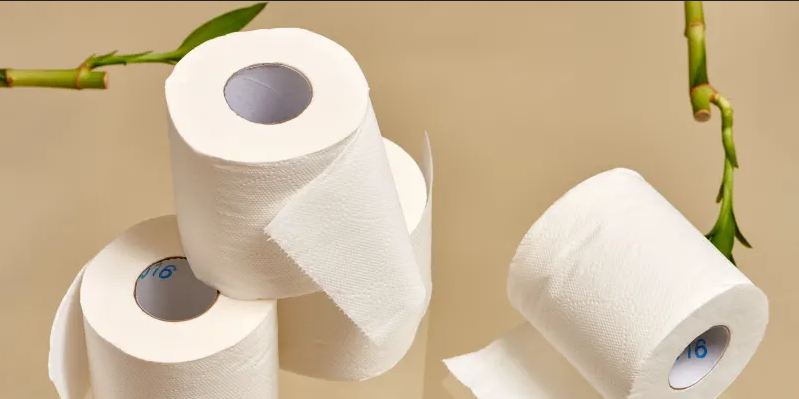
Recycled toilet paper comes from recycled paper, so it’s a bit of a misnomer to call it “recycled.” The name might be more appropriate for recycled office and copy paper, which has been heavily used and barely touched by ink.
However, this recycled toilet paper can be made from any paper source. This includes old magazines or catalogues—and will run you about $1 per roll more than standard TP.
Win #1: Recycled toilet paper can be used for multiple purposes.
As you can see, recycled toilet paper is an excellent choice for many uses around the house. It can clean your floors, windows, mirrors and even your face! You can save some money by using recycled toilet paper for these purposes instead of buying products made specifically for them.
Win #2: Recycled TP is less soft than other brands.
Recycled toilet paper is less soft than other brands. While it’s true that recycled TP comes from recycled materials, it may mean something other than that the end product will be more comfortable to use. Recycled TP usually comes from recycled paper and virgin pulp. Recycled paper uses newspapers, which is not the softest or most comfortable toilet paper.
Win #3: Recycled Toilet Paper has the same level of absorbency as standard TP.
That’s right, both recycled and standard TP comes from softwood pulp. This means that if you’re looking to use a more environmentally friendly option, neither one will be much different regarding absorbency.
Regardless of whether or not your recycled toilet paper performs worse than standard TP at absorbing liquids. You should still switch over because your paper products should be seen as part of a more extensive system.
Win #4: Recycled TP is often more expensive than regular rolls
Recycled toilet paper is often more expensive than regular rolls, which can be a deal breaker for many. However, if you’re concerned about the environment and want to do your part to improve it, this may matter little to you. It’s important to note that the price of recycled toilet paper can vary greatly depending on where you buy it from and what brand you choose.
This is because many factors go into making TP: manufacturers must pay for energy used during production, use machines and labour, and need materials like trees or bamboo plants (if not recycled). The cost of these resources will affect how much money companies spend on their products, which means higher consumer prices!
What is Bamboo Toilet Paper?
Bamboo is fast-growing, renewable and sustainable. It grows much faster than trees—up to three feet a day! It’s also an excellent option for those wishing to protect the environment because it can be grown without chemical fertilisers or pesticides. It is 100% biodegradable and fully compostable, making it an excellent choice for environmentally conscious consumers looking for eco-friendly toilet paper options.
Bamboo products are not only better for the environment but also better for you! It absorbs moisture from the air faster than cotton, so it stays dry after flushing your toilet paper into your septic tank or sewer system. This helps prevent clogs which can cause major plumbing issues in your home or business, including flooding around your house due to backed-up drains!
Read more: Bamboo Toilet Paper – Are You Using The Right Stuff?
Win #1: Bamboo toilet paper comes from a fast-growing, renewable natural resource.
Bamboo is a fast-growing plant—it can grow up to 36 inches (91 cm) in one day! Bamboo plantations can be established much faster than other resources like trees. It’s so fast-growing that you could replace all the toilet paper in your home with bamboo products and still have enough left to plant an entire forest.
Bamboo is also renewable, meaning we don’t need to worry about deforestation or depletion of natural resources because it grows back quickly. Plus, bamboo not only multiplies but also helps with soil conservation because its roots help hold the soil together and prevent erosion.
Win #2: Bamboo is a sustainable plant that grows much faster than trees.
Bamboo is a sustainable plant that grows much faster than trees. Bamboo can grow up to 3 feet in a day and will continue to grow if given the right conditions. Unlike trees, bamboo produces no pollen or seeds and doesn’t require any fertiliser since it regenerates itself by creating new shoots at the base of the plant.
Bamboo also grows in a wide variety of climates and soil conditions. Additionally, bamboo is one of the most versatile plants on Earth because it can be harvested for food, medicine, clothing, and building materials like flooring, furniture and even paper!
Win #3: Bamboo is 100% biodegradable.
You might be surprised to learn that bamboo is 100% biodegradable. It’s a natural resource that multiplies, and since it’s renewable, you can use it as much as you like without worrying about running out. What does this mean for your toilet paper? Well, anything made from bamboo is compostable—so throw it in the trash!
It’s important to note that not all types of bamboo are created equal. While some varieties take less than a year to grow after harvesting, others can take up to two years. The good news is that most companies who use bamboo in their products opt for the fastest-growing kind, so they still get maximum impact on our environment while being able to keep up with demand.
Win #4: Bamboo toilet paper production doesn’t harm the planet or its animals.
Bamboo is grass, which doesn’t require any fertilisers or pesticides to grow. It’s naturally resistant to insects and other pests, so no chemicals are needed for its cultivation or harvest.
Unlike trees, which are often grown as part of monoculture plantations that require pesticides and chemicals to produce. Bamboo is in a variety of locations, including tropical forests. These forests provide homes for many animals and serve an essential role in the environment by helping regulate temperature and water flow within ecosystems.
This is because many factors go into making TP: manufacturers must pay for energy used during production. They have to use machines and labour. They need materials like trees or bamboo plants. The cost of these resources will affect how much money companies spend on their products, which means higher consumer prices!
Win #5: Bamboo toilet paper is stronger and more durable than recycled paper.
Bamboo if you’re looking for toilet paper that can withstand the hottest flushes. Bamboo is stronger than recycled paper and more durable than regular toilet paper.
This means that if your cat or dog sneaks into the bathroom and starts chewing on your rolls of bamboo toilet paper, they won’t be able to chew through to get at the soft inner layers. And if someone accidentally drops their phone into the toilet while using it as a pee shower? Well, those hard outer layers will protect it from getting wet—which means no more expensive repairs!
Win #6: Bamboo toilet paper has a luxurious feel similar to high-quality tissue.
Bamboo is the way to go if you want the softest, most luxurious toilet paper. Bamboo is stronger than recycled paper and uses in various packaging types. Many eco-conscious consumers feel they’re trading off strength and durability for recycled content with recycled toilet paper. The fact that there are so many different brands of bamboo TP makes it easier to find just what you need. They’ll order some for you if they don’t have them at their store!
Win #7: Bamboo toilet paper comes in more versatile packaging.
Bamboo toilet paper is available in various sizes and shapes, including rolls, squares, and sheets. It comes in a variety of colours as well. There are solid colours such as green and white and patterns.
Recycled Toilet Paper Vs Bamboo: Who Wins?
So who wins?
Bamboo is a better choice than recycled toilet paper. It’s more environmentally friendly, more sustainable and more durable. Plus, it has a luxurious feel similar to high-quality tissue.
It is the way to go if you’re looking for an alternative to recycled toilet paper. It’s a more sustainable choice. When it comes to your hygiene and environmental impact, you have nothing to lose and everything to gain by choosing bamboo over recycled toilet paper.
It is the better choice, as it offers more benefits than recycled toilet paper. Although they’re both great options, bamboo TP wins out over recycled on most critical points.
Still not convinced? Try using Naturezway Bamboo TP, which is available at Amazon!
Conclusion
We hope we’ve helped you decide which product suits your bathroom. If you can’t make up your mind or want to try both, we recommend using them in combination. Bottomline, bamboo toilet paper wins out over recycled toilet paper based on our experience.
